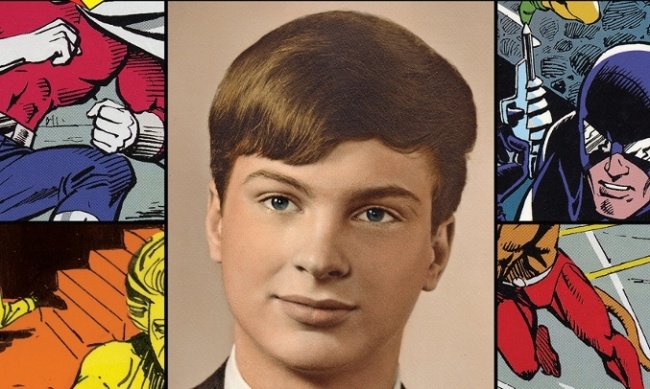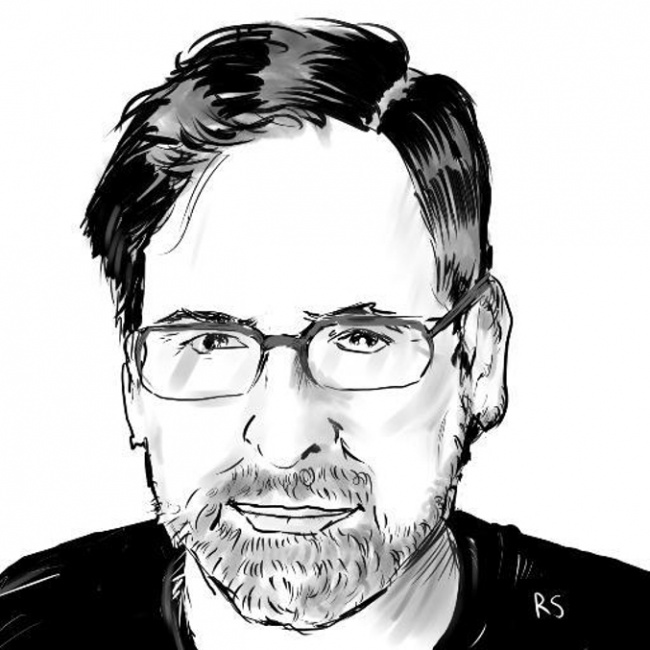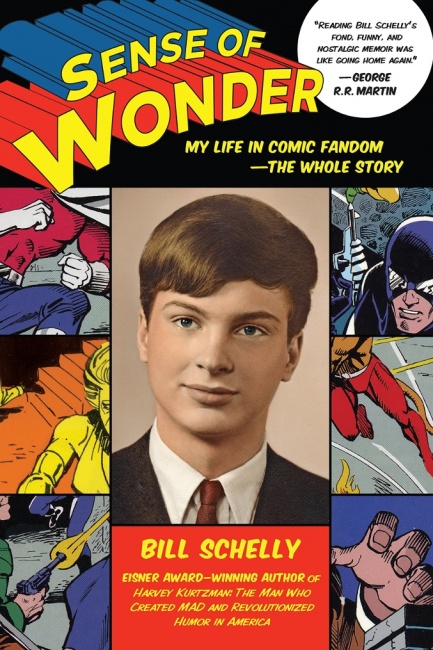RIP Bill Schelly. Word spread over the weekend that comics historian Bill Schelly died last week at the age of 67. Schelly was part of the original generation of comic fans and fanzine contributors from the 1960s, a period documented in his book Sense of Wonder: My Life in Comics Fandom. He became one of the most serious and diligent scholars of the medium, publishing substantial and well-researched biographies of creators including Joe Kubert, Harvey Kurtzman, John Stanley, Otto Binder, and most recently, James Warren. His Kurtzman biography won an Eisner Award in 2016 (ironically, over a biography of Will Eisner written by Paul Levitz).
Schelly’s death came as a shock since few knew he was ill. In fact, he’d been struggling with health issues over the summer and got a diagnosis of multiple myeloma (bone marrow cancer) in late August. He succumbed to complications from the treatment, according to his friend, writer John Lustig. "To many, Bill was the greatest historian and biographer that the comic book community has ever had," wrote Lustig in a public Facebook post over the weekend. "To those of us who knew him personally, he was also a kind, considerate and witty friend."All of us who write about comics and live in a world where comics receive respect as an artform and part of America’s cultural tradition owe Schelly and his generation a huge debt. Those early fans built the groundwork, established the rules of the road, and created the institutions – from communities to conventions – that we enjoy today. They did it all under the disapproving glares of their peers who mocked their passion and a culture that considered comics worthless or worse. Schelly felt even stronger pressures as a gay man who did not come to terms with his sexuality until much later in life.
Bill was a gentle man of great depth and an unsung giant in our business. He will be greatly missed.
Anti-Amazon uprising among indie-comics creators. A few days before SPX this past weekend, a group calling itself Cartoonists Against Amazon went public with a post on Medium demanding that “festivals cease accepting sponsorship money from Amazon subsidiary comiXology” on the grounds that its labor practices are “horrific” and it hosts Palantir, a company providing data services to Immigrations and Customs Enforcement (ICE), on its cloud platform. The group says that festivals who accept sponsorships from comiXology, including Thought Bubble and CXC, in effect empower Amazon to “exploit our precarity and instability to buy our silence,” and demands indie festivals perform an immediate, permanent and public break from Amazon/comiXology, in addition to providing “complete transparency regarding sponsorships and money allocation.” The post had nearly 90 signatures.
I get where these folks are coming from. Amazon, like many if not most large companies these days, does some ugly stuff. I’m from Seattle, where hating on Amazon is among our only major league sports. Though I can practically spit on their sprawling corporate campus from my office window, I don’t, because even if it made me feel better for a minute, it wouldn’t really do much except blow back in my face.
Let’s also consider that comiXology is one part of Amazon that’s actually doing what critics want the rest of Amazon to do: use some of their vast resources to support local organizations and independent creators. Foster actual human-scale culture, not just at giant corporate comic cons, but at indie festivals as well. Actively recruit diverse creators and eclectic content (and pay well for it, by the way) in an effort to actually expand the market so more people can make money. Turn some of Amazon’s technical wizardry to the advantage of small publishers to reduce the costs of printing and distribution. We can argue about whether they are doing any of that stuff perfectly or with the best intentions, but let’s face it: they are making discretionary investments into a community that isn’t at the financial center of the industry: investments that make it easier for some organizers to put on good events in their communities.
Knowing what I know about Amazon’s cheap AF (sorry, “thrifty”) corporate culture, I can’t believe those are easy battles for them to fight internally. But yeah, let’s call out the comiXology folks for stepping up, because obviously they’re the ones who could get Amazon to change its labor and business policies, right?
Here’s a thought: if Amazon as a whole does some things you don’t want to be associated with, maybe talk to your publishers about getting your books off their website and out of the comiXology catalog. Or, considering the realities of the situation, take the money and promotion that Amazon is putting into the indie comics community, use it to make comics that express your views without compromise, and get them into the hands of more readers. But demanding that indie festivals, who have a hard enough time making ends meet and are entitled to their own moral perspective on the pros and cons of accepting this kind of support, say no to significant funding on behalf of your principles smacks of the great E.C. Segar line, “Let’s you and him fight.”
Back to the 90s? Finally, word came Monday that Netflix has acquired the streaming rights to Seinfeld, which is somehow a gigantic coup even though the once-famous “show about nothing” is now 30 years past its debut.
Terms of the deal were not announced, but I will bet you a gallon of the Soup Nazi’s best batch that it was north of $500 million, because there was certainly a bidding war and Netflix was desperate to replace its other big hit, 90s sitcom “Friends,” which is decamping for WarnerMedia’s HBO Max service later this year. Meanwhile, a survey reported in Variety over the weekend suggests that what we really want to watch on Disney+ is The Simpsons, with sprinklings of Star Wars: Rebels, Duck Tales, and The Mickey Mouse Club thrown in for good measure.
OK, so we all want to use cutting edge 21st century technology to relive the big hits of 25-30 years ago. If we want to get out of the house, we can check out the latest Terminator or Rambo movie opening at the multiplex, or maybe a live-action musical theater recreation of one of Disney’s well-loved animated features… also from the 90s. Then we can go to the comic book store and pay $3.99 for a replica edition of a 30-40 year old DC or Marvel comic to re-experience the thrill of buying it for the first time.
It all really makes you miss the kind of nostalgia that Bill Schelly celebrated in his books: the kind you had to work for, by digging through musty old book shops or finding 16mm prints of classic movies, instead of just ordering it online and having it show up at your door the next day.
Nostalgia is definitely not what it used to be. I blame Amazon.





